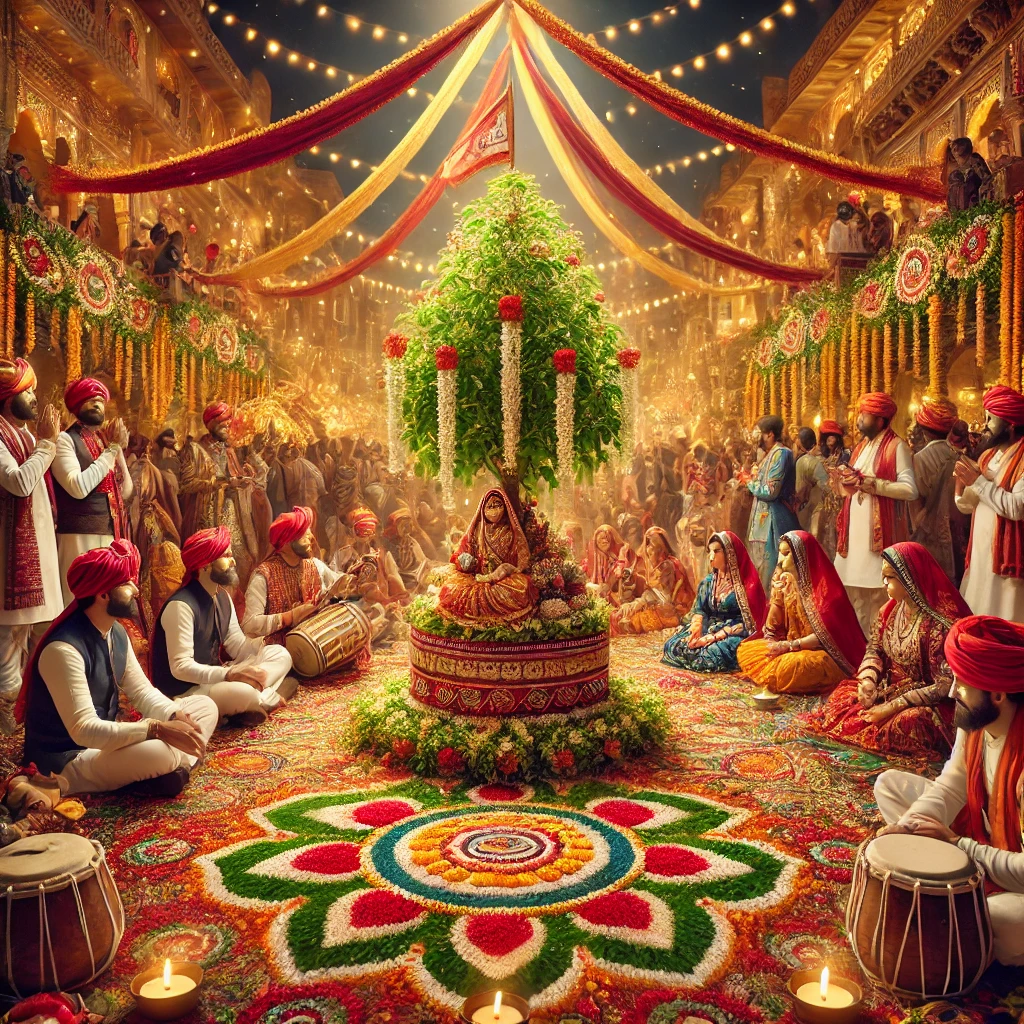
Dev Uthani Gyaras & Hingu Festival 2024: Celebrating the Divine Awakening of Lord Vishnu
Dev Uthani Gyaras & Hingu Festival 2024: Celebrating the Divine Awakening on November 12
The Indian festival calendar is rich with celebrations of divine events, and Dev Uthani Gyaras is one of the most spiritually significant. This year, Dev Uthani Gyaras, also called Prabodhini Ekadashi, will be celebrated on November 12, 2024. Marking the end of a sacred four-month period, the day celebrates the awakening of Lord Vishnu from his cosmic sleep, signaling the start of the wedding season and the onset of auspicious occasions in the Hindu calendar.
In the Mewar region of Rajasthan, this day also coincides with the lively Hingu Festival, a traditional observance filled with local rituals, folk celebrations, and the worship of Hingu Mata. Together, Dev Uthani Gyaras and Hingu Festival create a unique blend of spirituality, culture, and community celebration.
Significance of Dev Uthani Gyaras
According to Hindu mythology, Lord Vishnu, the preserver of the universe, enters a deep cosmic sleep known as "Yoga Nidra" on Dev Shayani Ekadashi, and awakens on the eleventh day of the Kartik month, Dev Uthani Gyaras. This period of rest, known as "Chaturmas," is observed with minimal celebrations, ending with Vishnu's divine awakening. This day marks the resumption of auspicious events, including weddings, home blessings, and other celebrations.
In many parts of India, especially Rajasthan and Gujarat, this day is celebrated with the symbolic Tulsi Vivah ritual, where the holy basil plant is ceremonially “married” to Lord Vishnu, represented by a Shaligram stone or Krishna idol. This divine union symbolizes prosperity, blessings, and family well-being.
The Hingu Festival: A Unique Tradition in Rajasthan
In Rajasthan’s Mewar region, Dev Uthani Gyaras is celebrated as the Hingu Festival, a day when devotees pay homage to Hingu Mata, a local deity revered for her protection and blessings. Devotees from nearby villages gather to participate in processions, sing traditional folk songs, and offer prayers to Hingu Mata, strengthening community bonds.
The Hingu Festival is a colorful display of Rajasthan’s rich cultural heritage, with villagers donning traditional attire, singing ancient hymns, and participating in community feasts. It’s an occasion for families to come together and honor Hingu Mata, seeking her blessings for health, prosperity, and protection.
Key Rituals and Traditions of Dev Uthani Gyaras & Hingu Festival 2024
Early Morning Purification
Devotees begin the day with a ritual bath, often in sacred rivers or lakes, as a symbolic act of cleansing. It is believed to wash away past sins and prepare devotees for receiving divine blessings.
Tulsi Vivah Ceremony
In homes and temples, people prepare for the Tulsi Vivah, where the holy basil plant, symbolizing Goddess Lakshmi, is ceremonially married to an idol of Lord Vishnu or Krishna. The plant is adorned with flowers, red saree, and jewelry, and traditional wedding hymns are chanted. The ritual celebrates prosperity, devotion, and the divine union of Vishnu and Lakshmi.
Fasting and Offerings
Observing a fast from sunrise to sunset is customary for many devotees. After the evening prayers, offerings of fruits, sweets, and flowers are presented to Lord Vishnu, expressing gratitude for his blessings and guidance.
Hingu Mata Processions and Cultural Celebrations
In Rajasthan, devotees celebrate the Hingu Festival with a lively procession carrying the deity’s idol through village streets, accompanied by folk dancers, singers, and musicians. Villagers bring traditional foods to share, creating a communal feast that strengthens social and familial bonds.
Community Prayers and Feasts
Families gather to prepare and share traditional sweets, such as laddoos and kheer, as part of the festive offerings. The food, offered as prasad, is distributed to neighbors and relatives, fostering unity and goodwill among communities.
Regional Celebrations Across India
In different regions of India, Dev Uthani Gyaras is celebrated with local customs. Temples across Gujarat, Maharashtra, and Uttar Pradesh are adorned with lights, flowers, and decorative Rangoli. In Maharashtra, devotees chant bhajans, while in Gujarat, the festival is marked by vibrant folk dances and temple gatherings. For farmers in these regions, Dev Uthani Gyaras is a day of offering gratitude for the harvest and seeking blessings for future prosperity.
Spiritual Importance of Dev Uthani Gyaras and Hingu Festival
Dev Uthani Gyaras holds deep spiritual importance as a day that symbolizes divine awakening. The awakening of Lord Vishnu from his cosmic slumber is a reminder for devotees to awaken their own spiritual consciousness, make mindful choices, and live in devotion to God. Through the Tulsi Vivah and the rituals of Hingu Festival, people reconnect with their faith, seek blessings, and celebrate the virtues of humility, love, and family unity.
The Hingu Festival, specifically celebrated in Rajasthan, adds a local cultural touch that highlights the reverence for local deities and the vibrant traditions of the region. The day is an occasion for people to renew their vows of devotion, foster a sense of community, and share in the joy of togetherness.
Celebrating Dev Uthani Gyaras & Hingu Festival 2024: A Day of Divine Blessings
This November 12, 2024, Dev Uthani Gyaras and Hingu Festival will bring communities across India together to celebrate divine blessings, the renewal of auspicious events, and the vibrant traditions that make each region unique. From the Tulsi Vivah rituals to the lively processions and feasts, the festival captures the essence of gratitude, devotion, and joy.
As families gather to observe these traditions, the day reminds us of the cyclical nature of life, the value of spiritual awakening, and the importance of celebrating divine grace. May this Dev Uthani Gyaras and Hingu Festival 2024 bring prosperity, peace, and blessings to all.
